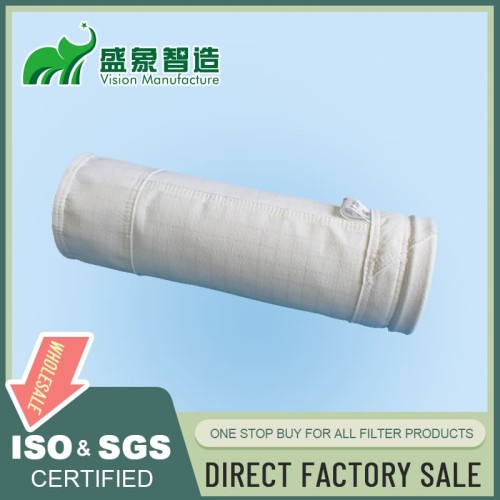
Combed Cotton in Industrial Filtration Enhances Quality and Performance
In industrial applications, the quality of fabric used plays a pivotal role in ensuring efficiency and durability. Among various types of cotton used in these sectors, combed cotton is distinguished by its superior quality and performance. Here, we explore the critical role of fabric quality, delve into the unique properties of combed cotton, and examine its diverse applications in industrial filtration.
Understanding Fabric Quality in Filtration
The fabric's quality is paramount in industrial filtration systems where:
- Efficiency: High-quality materials ensure better filtration efficiency, capturing even the smallest particles.
- Durability: Materials need to withstand the rigors of industrial processes, from high temperatures to chemical exposure.
- Contamination Control: The right fabric can reduce the risk of secondary contamination, crucial in sensitive industries.
Types of Cotton for Industrial Use
Standard Cotton
- Basic Processing: Standard cotton undergoes minimal processing, retaining shorter fibers and potential impurities.
Combed Cotton
- Advanced Processing: Combed cotton undergoes additional processing, known as combing, which:
- Removes Shorter Fibers: Results in a cleaner, more uniform fabric.
- Enhances Durability: The longer fibers provide greater tensile strength.
- Improves Texture: Creates a smoother, softer fabric with less linting.
Advantages of Combed Cotton in Filtration
Combed cotton offers several advantages in industrial filtration:
- Filtration Efficiency: Its finer fiber quality efficiently traps fine particles, reducing the risk of contamination.
- Durability: Withstands harsh environments, from high temperatures to abrasive dust, ensuring long-lasting performance.
- Hypoallergenic: Ideal for sensitive applications where even trace contaminants can cause issues.
- Sustainability: Being a natural fiber, combed cotton has a lower environmental impact compared to many synthetic options.
Industrial Applications
Chemical and Pharmaceutical Industries
- High-Purity Filtration: Combed cotton's purity is crucial for filtering sensitive chemicals or pharmaceuticals where contamination must be minimized.
Water Purification
- Effective Particle Removal: Combed cotton filters excel in removing particulate matter, ensuring cleaner water in various applications.
Air Filtration
- Improved Air Quality: Used in air filtration units to capture dust and pollutants, enhancing indoor air quality in industrial settings.
Integration with Synthetic Materials
- Hybrid Filtration Solutions: Combed cotton can be combined with synthetic fibers to create hybrid materials that offer enhanced filtration properties while maintaining sustainability.
Combed Cotton vs. Synthetic Fibers
Strengths of Combed Cotton
- Cost-Effectiveness: Generally less expensive than high-performance synthetics.
- Filtration Efficiency: Competes favorably with synthetics in capturing fine particles.
- Environmental Impact: A more sustainable choice, with lower energy and chemical use in production.
Weaknesses
- Longevity: May not last as long in highly abrasive or corrosive environments.
- Resistance: Synthetic fibers might offer better resistance to microbial growth or extreme conditions.
Case Studies:
- Pharmaceutical Manufacturing: A case where combed cotton filters reduced contamination rates significantly, ensuring compliance with regulatory standards.
- Water Treatment: An example of combed cotton filters successfully used in municipal water treatment, improving water quality while being cost-effective.
Maintenance and Best Practices
To maximize the lifespan and efficiency of combed cotton filters:
- Cleaning Techniques: Use gentle methods to avoid damaging the fabric. Vacuuming, gentle washing, or air cleaning are recommended.
- Regular Maintenance: Schedule regular inspections and cleaning to maintain peak performance.
- Troubleshooting: Address common issues like pressure drop increases or filter clogging promptly to avoid system inefficiencies.
Innovations in Combed Cotton Production
Technological advancements are continually shaping the production of industrial-grade combed cotton:
- Advanced Combing Processes: Enhance the removal of impurities and short fibers, improving the fabric's quality.
- Sustainable Treatments: New treatments aim to reduce environmental impact while improving filtration properties.
Future Trends in Cotton-Based Filtration
The future of cotton-based filtration technologies looks promising:
- Material Enhancements: Research focuses on enhancing cotton fibers' properties, like strength, moisture resistance, or antimicrobial capabilities.
- Emerging Markets: New markets and applications are emerging, from cleanroom environments to high-performance filtration needs.
- Hybrid Materials: Combining cotton with advanced synthetics could revolutionize filtration, offering sustainability alongside superior performance.
The Strategic Importance of Material Selection
Selecting the right filtration material is crucial for:
- Operational Efficiency: Ensuring systems operate at their peak.
- Compliance: Meeting stringent industry and environmental regulations.
- Sustainability: Choosing materials that align with sustainability goals.
Explore how Vision Filter can guide you in selecting the perfect filtration material for your industrial needs. Contact Us to discuss your unique requirements and ensure top-tier performance in your operations.

